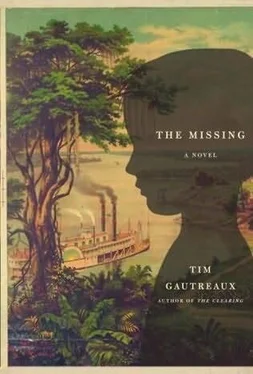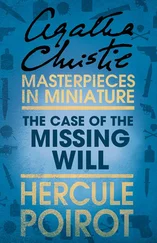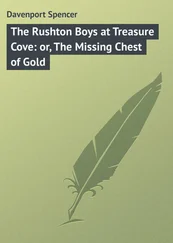Comeaux looked down the side of the endless barrel. “Now, I can’t guarantee where this t’ing is gonna hit. I figure we should try to put one in the slope below them shells, and maybe that’ll tell us how to adjust.”
Sam was twenty-three, an age when a man would just as soon do one thing as another without thinking about it much, but he was uneasy when he looked downrange. If they could figure an impact point with this test shot, he couldn’t imagine a miss with a second. Summoning within himself a dumb optimism for the perfect hit, he decided not to ask the lieutenant to reconsider. He even envisioned a commendation for developing a new technique for battlefield disposal. Suddenly, something big detonated two miles off, a cloud of black smoke rising like an Indian’s signal, and his confidence shrank. They glanced nervously at one another.
“Be sure to aim low,” Sam told Comeaux, who turned the elevation wheel to lower the barrel and then pulled the plug out of the muzzle.
“All right, all right!” Robicheaux hollered. “Let’s plow us a hole.”
Comeaux held the lanyard tentatively in his hand as the lieutenant shooed the horses away, waving his billed cap and crying out like a schoolboy. Everybody except Comeaux crouched down behind a line of sandbags.
Comeaux turned his back and squinted. “Fire?”
“Check the lookout first,” the lieutenant told him.
Comeaux raised his field glasses and saw the makeshift flag a thousand yards to the west, waving on the hill.
“He says it’s clear.”
“Then fire,” the lieutenant said, squatting low behind the sandbags.
Comeaux opened his mouth wide, bent his knees, then gave the lanyard a jerk.
The gun bucked back with a head-flattening concussion. Sam thought that his soft palate had fallen down his throat, and his ears strummed as though struck by lightning. They all hugged the ground, Comeaux dove under the gun’s axle as it rocked back and forth, everyone preparing, as the shell screamed downrange, for the second explosion to fall on them like a mountain.
They heard nothing. Sam looked up and saw the pile was intact. Stunned, Comeaux unlocked the gun’s breach and looked into the smoky hole, as if convinced the shell hadn’t been launched. He turned slowly and raised his shoulders. Then, far off, they heard it: a dull and profound whomp, maybe five miles away.
“We missed,” Sam announced, and his voice sounded tinny in his singing ears. He knew then he should have stopped the whole thing and that for the rest of his life, whenever he performed some stupid action to save time or inconvenience, he would feel the way he did now, like a lazy, rash fool.
“Oh, my,” the lieutenant said.
They all looked at one another, frozen, knowing.
Sam began running toward one of the horses.
“Where are you going?” the lieutenant shouted.
“I’ve got to see where that damn thing came down.”
The officer ran after him for a few yards, gesturing wildly, but Sam had jumped on the scarred bay and booted him off. “Stop, private! That horse might step on a shell.”
The animal, confused at first, gradually fell into a rough gallop around the stumps, craters, and islands of wire to the ruined road that ran up a slope in the direction the shell had flown. When Sam looked back, the men stood watching him, motionless, the thin lieutenant now waving as if to a relative on a departing train. Then he went round a bend and they were gone. He charged on over dry ruts and through the wrecked lorries and tanks and a burned-up aero-plane, reining the horse in when the road veered off in the wrong direction. Praying for luck, he soon found an old stone pasture wall and trotted along that, the horse kicking up rifles in its wake. Hundreds of German Mausers lay abandoned along the fence, and he imagined the fight, the assassination of troops approaching the wall, the bayonet-driven countercharge, the panicked retreat up the hill, the screaming slaughter. In a defile between two long hills he turned the bay through a blasted gap in the stone, but the animal stopped dead. Sam kicked away at its flanks, but the big horse took it and stood like a pillar. He looked around, wondering if the animal remembered what had happened here, and dismounting, he looked into the liquid eyes, which seemed deliberately unfocused. He put a hand on its neck and the muscles were taut as fence wire, and he saw that its legs were trembling. He led it back through the wall by its bridle, remounted, and then put the animal forward along the stones, moving away from the place where twenty shattered limbers and many swollen horses lay about as if rained down from a murdering sky.
He studied the land ahead of him, and within a mile he rode into a squad stacking bags of cordite for demolition and reined up. A lanky private told him that he’d heard a shell rocket overhead. “They ain’t startin’ up again, is they?”
“No.”
“I’m glad of it. After I seen all this mess I’m glad I missed the big ruckus. We just turnt over a steam tractor and found two skeletons from Alabama.”
Sam started the horse through a shell crater the size of a city fountain, rode into a dry canal and out again over a dike. Rising in the distance was a plume of white smoke. He whipped the bay with the reins and got up as much speed as he could, riding through a hedge and out into a mud lane, expecting to be blown up at any second. Suddenly he was in a village, coursing among sheds and small houses of bullet-pocked stucco and a large barn missing half its roof. A quarter-mile on, at the edge of an open field, sat the remnants of a small stone house, its blocks dispersed over an acre, its thatch roof on fire. In the dirt lane out front lay a girl, her long hair splayed on the ground as by an electrical charge. He jumped off the horse and carried her away from the flames, propping her against a low stone wall. No one else was around.
She appeared to be about eleven, but when she opened her eyes they were watery and old.
He asked her in French if anyone else had been in the house.
“Non, monsieur.” She seemed alarmed by his voice and asked where he was from, but he ignored her.
“Où sont tes parents?”
“Je ne sais pas.” She raised her right hand and it was streaming blood, the little finger cut off cleanly at the base. Then she told him she thought her parents were in heaven, and that everyone in the village had been killed or driven away. Suddenly she winced, grabbed her arm, and began to sob.
“Quel est ton nom?” he said, trying to distract her as he sat her up on the stone wall.
“Amélie,” she cried.
He pulled out his canteen, washed the wound, poured in disinfectant powder from a kit in his belt pack, and applied a rude bandage meant for gunshot wounds. Leaving her clutching her hand in the folds of her heavy skirt, he walked a circuit through the nearby buildings, all of them empty, though in one house there was a meal on the table, the food dried like scabs on the plates, as though every-one had fled months before and never come back. At the open rear door he looked across a steep field covered with frostbitten weeds, imagining the panicked family running away from an incoming barrage, hoping to reach safety behind the next hill. He knew the girl was alone and would probably starve to death.
He went back and asked her full name.
“Amélie Melançon.” She squinted up at him. “Et le vôtre?”
“Sam Simoneaux.”
She repeated his name, her eyes growing round. “Il y a des français en Amérique?”
He explained where he lived and that there were indeed French people in the countryside to the west of there. He described New Orleans and asked if she had heard of it.
Читать дальше












